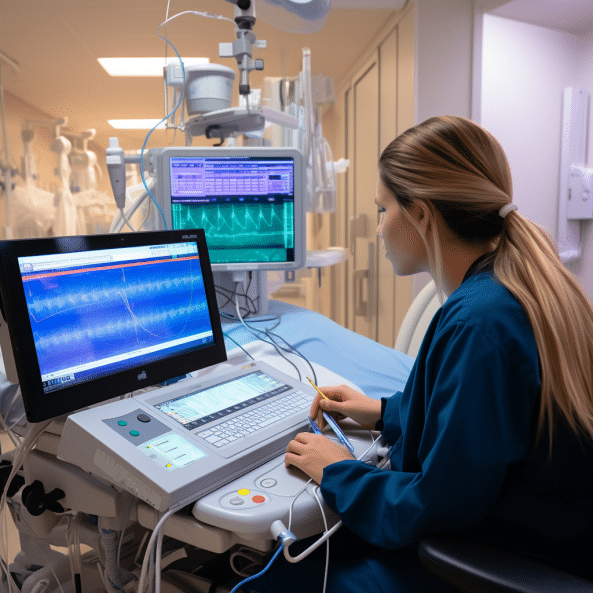
Recording ultrasound in hospitals: Understanding the Limits
Recording ultrasound in hospitals: For many women, the thought of being filmed during pregnancy is positive. It can serve as a fun way to share your growing belly with friends and family, or you can use it to get the best prenatal care possible.
Similar to a birth announcement, filming your ultrasound can help you remember a minor procedure or a significant moment. Many hospitals don’t allow ultrasound recordings since doctors and nurse practitioners must remain attentive during the test.
So doctors can’t just look at a screen or flick through ultrasound images to tell you what they see. Recording the entire process may distract them because they must be extra careful.
Read on for ultrasonic recording information.

What Is Ultrasound?
Ultrasound is a technology that uses high-frequency sound waves to produce images of internal body structures. Doctors do this using either a transducer or a probe that emits the sound waves, which are then sent to the transducer. The resulting image will be displayed on a monitor or projected onto the patient’s skin.
Ultrasound is frequently used in medicine to provide high-quality pictures of organs and tissues without causing damage.
How Ultrasounds Works
Obstetrics, gynecology, and other specialties employ ultrasound for diagnosis. It can explain fetal abnormalities including Down syndrome and spina bifida.
Ultrasound transmits high-frequency sound waves into body tissues via a transducer. The transducer vibrates at ultrasonic frequencies of 20 kHz or higher, which humans cannot hear.
An ultrasound machine puts out one or more sound waves with varied frequencies and intensities to reflect off body structures.
The reflected sound waves are turned into electrical impulses that create an image of your circulatory system and other body components. This image can be viewed on a monitor or ultrasound machine.
Ultrasound machines vary in size and design, but most have at least one ultrasonic transducer, and some have multiple transducers for different purposes. For example, you may need a small transducer for internal use only (such as for your thyroid gland) and another larger one for external use (such as for a pregnant woman).
Why Recording Your Ultrasound May Be Prohibited
There is a lot of misinformation about the legality and safety of recording your ultrasound. Some hospitals won’t allow it, while others set strict recording conditions.
There could be many reasons for this, but the most common is the liability if the operation goes wrong. So they don’t want to be sued or have their reputation destroyed. Below are other common reasons why recording ultrasounds may be prohibited in some hospitals.
- It is a distraction for the sonographer.
The sonographer may also find it difficult to concentrate on the scan if they know someone is filming from behind. This means that they may miss out on key information about your baby, which could result in errors in diagnosis.
- They can’t guarantee that the recording will work.
Ultrasound machines can malfunction. You may potentially have a faulty connection or device failure during recording.
Avoid recording if you want to keep this information secure—it’s too easy to do.
- Recording an ultrasound takes focus away from the test.
In a nutshell, when you record an ultrasound, your doctor will usually instruct you to hold up a card with the ultrasound image and give that to the technician so they can follow along with what is evident on the screen.
This will make it easier for them to visualize the baby’s anatomy and identify abnormalities. However, holding up a card or even pointing out specific features during an ultrasound can take away the focus, causing distraction.
- It could be considered medical malpractice.
In some states, recording ultrasounds is prohibited because it could be considered medical malpractice if there was no intention to use that information for diagnostic purposes only.
However, this depends on local laws, so check with your state’s Department of Health or licensing board before performing any recording at home.
It Comes Down To Hospital’s Decision
The details vary from hospital to hospital, but the basic restrictions are the same. The hospital usually says they want to protect the patient’s privacy and personal information. It is somehow reasonable since it will prevent the commercialization of ultrasound images.
Similarly, the hospital may have concerns about liability and privacy issues. They would be held liable if something went wrong during the procedure and if there was malfunctioning equipment.
The same goes for any other procedures performed at the facility — such as surgery — which could cause injury or death if something goes wrong during the procedure itself or if there are any problems with equipment used by staff.
Ultimately, the hospital will decide based on its own policy and guidelines. If they allow recording, then they should allow you to bring a friend or relative with you as well as/instead of a technician.

Bottom Line
Unfortunately, most facilities will not let you record your ultrasound. There are, however, a few exceptions. If you are in a rural area, the best way to go may be to check with the nearest facility. If that is not an option, at least talk to your doctor.
Although they have nothing financial to gain in letting you record the ultrasound and take it home with you, they may be willing to allow this special request for a patient who has been at very low risk throughout the pregnancy.
Doing so will create a much better experience for yourself as well!